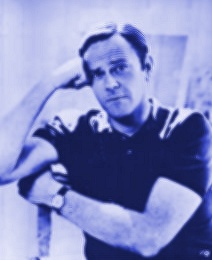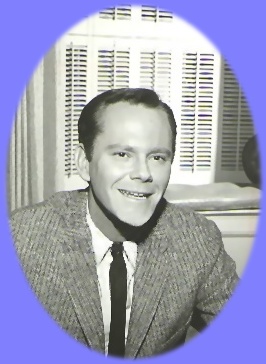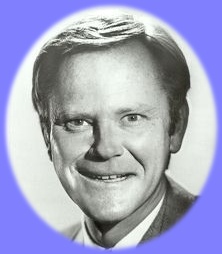NO MORE 'STRAIGHT MAN'
Dick Sargent is Out and Proud

By Owen Keehnen
|
Dick Sargent is known to most people as "The Second Darrin Stephens." The truth of the matter is he was actually cast before Dick York (along with Tammy Grimes as Samantha) but had to turn down the role due to a commitment to another series. Regardless, Dick Sargent's career was much more expansive than Bewitched. He appeared on dozens of TV shows (Charlie's Angels, L.A. Law, Murder She Wrote, Different Strokes), a series of his own (Broadside), TV Movies and mini-series (Rich Man, Poor Man, The Power Within), as well as theatrical films (Operation Petticoat, Hardcore, Live a Little Love a Little). But on National Coming Out Day in 1991, Dick Sargent gave up the role of "straight man" and became known for an entirely different reason. On that day, Dick Sargent took that big freeing step out of the closet. In 1991 so few actors were openly out as gay men that it made quite a significant impact. Overnight he went from playing roles to being a role model. Sargent himself admitted that he initially came out mostly to clarify the derogatory details of the gay life he supposedly led when he was outed by The Star. However, once out he became a leader to many through his visibility as well as his activism. In the months to come Mr. Sargent dedicated a great deal of energy to aiding gay and lesbian causes (in addition to his ongoing commitment to The Special Olympics). He even was Grand Marshall, along with Elizabeth Montgomery, of the Orange County Pride Parade of 1992. Unknown to all but those closest to him, Dick Sargent had also been battling prostate cancer since being diagnosed in 1989. Despite radiation as well as a myriad of other treatments, Dick Sargent died on July 9, 1994. When I talked with Dick it was in early 1992, only a few weeks after he had come out. It was apparent by his enthusiasm and demeanor that a burden had been lifted from him. Chatting with him it was interesting to see how his "fear of coming out" was so much greater than the actual repercussions of doing so. He was elated and a man on a mission. Looking back I can't help but see it as somewhat sad that this brave and giving man seems to have no greater epitaph than "The Second Darrin Stephens." Maybe seeing him in this light presented in the following interview will correct some of that?
O: Congratulations. DS: Thank you. O: How are you doing? DS: Great. The reaction has been incredible, really marvelous. O: What were the events leading up to your decision to come-out on National Coming Out Day? DS: Probably just living 61 years. It was a question of the right time and the right place. I was partially outed by 'The Star' in April, but I'd been thinking about it for almost two years. O: What was your reaction to being outed? DS: I'm suing them. O: That good huh? DS: (Laughing) No, I'm not suing for the original story but for the follow-up article that was totally untrue. The original story was that I was involved with a gay for 6 months and that I was gay. I can't deny those facts. The rest was all just bullshit…that I bought him a car and we watch porn movies all the time. But you can't sue for bullshit, so I'm suing for the follow-up squib that said the police had to be called to evict my ex and myself from our West Hollywood bungalow for trashing the place. It makes me out to be a criminal. We never shared the bungalow and the police were never called. O: What a vicious tabloid lie. What has the public response been to your coming out? DS: 100% positive. I've had a couple of people not know what to say, but they weren't friends. None of my friends were shocked or upset or anything. I've had total strangers come up to me and thank me for what I'm doing. I get notes in the mail thanking me. A friend of mine said the entire thing was like a big personals ad. Recently I did a Geraldo and when he introduced me there was tremendous applause that went on and on and when he asked if anyone in the audience thought less of Dick Sargent because he was gay, not one hand went up. The press has been great. I've done a Sally Jessy Raphael, Larry King, and One on One. People magazine did a piece last week which was nice. O: Speaking of People magazine you were featured in The Lesbian and Gay Public Awareness Project's full-page advertisement that is scheduled to appear in the December 23rd issue. Tell me a little bit about that project? DS: Well, when I was growing up there were no role models. We had nobody. I represent that square comedy image which I don't think anyone associates with gay. The ad is to let people know that we're not all drag queens or motorcyclists, not that there's anything wrong with that. It's to show people that we're just people and that we're everywhere in their lives whether they know it or not, so learn to accept us. I'll be curious to see what the reaction will be. The ad is definitely groundbreaking. But on a level that's acceptable too. People can look at that ad and think, "My God, they look like my mother, or my father, or my son, or whatever." O: What have been the professional repercussions of your coming out? DS: I can't tell. I did a job on P.S. I Love You a couple weeks ago but that was through a friend whose son is a producer. I can't really tell yet, long dry spells are par for the course. O: How do you respond to critics who claim your coming-out was a publicity stunt to revive your career? DS: I'll never understand how anyone can think that. Geraldo asked, "Do you think this will be a shot in the arm?" and I said, "Yes, a shot of cyanide." I expect to continue doing voice-overs because that's anonymous and I might do some guests spots, but I don't think they'll ever hire me as the father of a family again. A lot of producers and directors wouldn't give a shit, but I don't think on a sponsor level they'll hire me as a regular. O: Has your coming out been accepted on a personal level within the industry? DS: I went to see Chita Rivera yesterday and we were in the front row and she kept looking at me and at the end of the show blew me a kiss so we went backstage. I was with Betty Garrett and some other people and Chita said, "I saw you on Sally Jessy and you were wonderful. Thank you so much for what you're doing." It's been like that. I don't even know her. People in the profession have come up to me and thanked me. It's really lovely. I had dinner with Elizabeth Montgomery a few nights ago. O: What has her reaction been? DS: Well, she knew because my lover was alive when we did Bewitched. We would go to parties with her and her husband and at each other's houses and we played tennis together. That sort of thing. She really loved my lover very much. He was a dear man who dropped dead of a cerebral hemorrhage 12 years ago. But Liz respects the hell out of me for doing this. She thinks it's marvelous and has nothing but encouraging words to say. In April, when The Star article came out they quoted everyone like they talked to them. So I called Liz and read her quote that was, "Well, if that's his lifestyle I just hope it makes him happy." Anyway, I told her this and Liz said, "Oh shit, oh shit…they gave me the only cliché in the article." I love her. She's a very bright and caring lady. O: I'm curious. What exactly is the closet like in Hollywood? I mean is it more 'No one must know' or is it more of a secret society or what? DS: A combination. I hadn't been going to gay bars since my lover died, but recently I started going back again. I've never hidden that. There are a few others who would never do that. However, they will appear with gay people in an entourage. I'm not going to mention names, but there are many who everybody knows is gay, but who haven't come out. Therefore they're still working. It's very unfortunate that it has to be that way? O: What do you think has to occur if homophobia is ever going to be conquered in Hollywood? DS: I think people will always want something to hate. I think that might be around until we're an evolved rare, which will be several thousand years. But I think because of AIDS and the publicity about gays in general, that people are more understanding and accepting than they've ever been. I'm not patting myself on the back, but if more people did what I did…it's a matter of "Yes, I'm gay...now let's get on with our lives." That's not what I'm alive for, that's not what any of us are alive for. For chrissakes, no one is alive to be heterosexuals and have babies or anything else that's taught us all our lives. We're all just people who deserve the respect that everyone else gets. O: Are you planning on continuing your newly adopted activist role? DS: I'm booked to speak at a few places. All I get is expenses, airfare, and hotel. In other words, I don't make any money on them. That's my contribution. O: Time and energy are probably the best contributions anyone can make. DS: In my wildest dreams I never thought I'd become a role model for anything. I never thought this kind of thing would happen then all of a sudden it fell together. I'm so happy I did it. It takes such a burden off you in a million ways you never think about. It has a very calming feeling. O: Is there a tell-all bio in your future? DS: No. I've had an offer, but I don't think my life has been that interesting. That's awful to say. I've known and worked with some famous people and I have some funny family stories, but that's all talk. O: How did you get cast on Bewitched? DS: I was set to do it originally. I had the interview and by the time they got back to me I had already signed on a series called Broadside, so Dick York got it, but I was their original choice. O: I have to ask you this. What was Agnes Moorehead really like? DS: I can always tell someone is gay when they ask that question. O: I confess, I'm gay. DS: She was very set in her ways and I had to really make her my friend. About the third or fourth show I was in she said to people in front of me, "They should never meddle with success." Meaning Dick York should never have been replaced which I thought was a very cruel and unthinking thing to say in front of me. But that was her. She came to rehearsals with a Bible in one hand and her script in the other. She was certainly the most professional woman in the world…and she was so good. Thank God we became friends eventually. O: I read in The Advocate that you are also active with The Special Olympics. DS: I've done work for The Special Olympics for about 20 years. I was on The Board of Directors in California for a while. Eunice Kennedy Shriver and the whole family are all friends of mine because they started the whole thing. I was a little afraid of what their reaction might be. But I saw Eunice at another benefit a couple weeks ago and she said, "Dick, I've been reading about you, keep up the good work." I replied that it gave me a whole new mission in life. And she said, "Well, you still have The Special Olympics." That eased my mind. O: So much of your time seems donated. That's truly admirable. DS: That's the only joy in being recognized really. Most of it is a pain in the ass. It can get you a theater ticket or a better seat in a restaurant, but a lot of times it's having your dinner interrupted or being asked for an autograph at the urinal. The real joy in it is using it like I'm using it now.
Source: Owen Keehnen's article originally appeared in Chicago Outlines. It will also be featured in Keehnen's upcoming book of interviews called Blatant Regard. |


